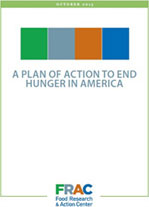The governor of Vermont, Phil Scott, recently signed the Universal School Meals Act (S.100). This legislation makes free breakfasts and lunches available to all students in the state for the 2022–2023 school year. Vermont is the third state to pass Healthy School Meals for All legislation, following California and Maine. Several other states are working to enact similar policies.
Since the beginning of the pandemic, schools have been able to offer breakfast and lunch to all students at no charge, allowing all children to experience the critical health and educational benefits associated with school meals. This was done through Congress giving the U.S. Department of Agriculture (USDA) nationwide waiver authority.
FRAC spoke with Faye Mack, the Advocacy and Education director at Hunger Free Vermont, to learn more. Read her interview below.



